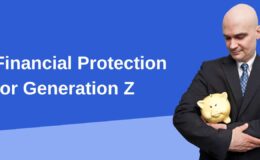We awaken to discover that we’re not happy. We’re no longer calm, healthy, or financially secure; instead, we’re living a stressed-out, sluggish zombie existence. What’s going on here?
Surprisingly, most of the time, it’s due to little frequent flaws instead of a dramatic occurrence.
Meet Harshita.

She’s a university student who works hard in the classroom and leads a happy life. She is an international student building her career in biomedical engineering and she loves to explore the city adjacent to campus.
But, she doesn’t realize that her daily impulse buying when online shopping and drinking a White Mocha Frappuccino with a shot of espresso twice a day will result in her being twenty-five pounds overweight in addition to falling short of her financial goals in five years.
These money habits appear to be little more than harmless vices to Harshita. She may believe they don’t matter, but over time bad money habits add up to powerful effects.

There is a simple 1 in 60 rule that pilots use when flying planes. If a plane’s heading (direction) is off by just 1 degree the plane will be 1 mile off course in 60 miles. Small details over time add up to a big miss! Imagine missing the airport…
Financial goals are often missed because of a number of small “Papercut” money habits that divert money away from your abundant life. That’s why we built the Papercut Calculator to help you see how much your Papercuts are costing you. Small improvements to your money management practices will significantly impact your future success but have essentially no impact on your present daily life.
If you want to learn more about habits that can cost you your financial freedom, check out our article – 9 Papercuts That Might Be Costing You Your Financial Freedom. Take control and build better money habits in order to reach financial freedom!

Harmful Money Habits
Here are fifteen common, yet harmful money habits to avoid:
1. You Think Debt Is Normal
Debt has become so normalized that people often don’t even question it. But the truth is, debt is actually harmful to your financial success. It can cause a lot of stress and anxiety, and it can make it difficult to save money or reach your financial goals.
Many people accumulate small amounts of debt each month, from bank-guaranteed debt to student loans, and later find that their debt balance has reached a painful level in a year or two. Debt can quickly eat away at your personal finances and can keep you from saving money to fund your personal joys in life.
2. You’re Trying To Keep Up With The Joneses
If you’re constantly comparing your financial situation to others, you’re setting yourself up for disappointment. Everyone’s financial situation is different, and what works for one person might not work for another. Focus on your own personal finance journey, and don’t worry about what everyone else is doing. Your top priority should be your financial picture, not how those around you spend money.
3. You’re Not Using Compound Interest To Pay For The Second Half Of Your Life With Passive Income
It’s never too early to start saving money and to use the power of compounding interest to fund the second half of your life. The sooner you start, the more time your money has to grow. This is an important money habit that is often overlooked until later in life. Waiting to invest is one of the most common financial mistakes that can keep you from practicing good money habits.
The average annualized return of the S&P Index from 1957 through Dec. 31, 2021, is 10.67%. That means that $100 a month from age 20 to age 55 grows to $451,940 with the historical rate of return.
4. You Use Credit Cards Without A Plan And End Up With Excess Credit Card Debt
Credit cards can be a useful tool if used correctly. But many people use them without a plan and end up going into credit card debt. If you’re not careful, credit cards can also lead to overspending and high monthly payments.
5. You Don’t Have An Emergency Fund
An emergency fund is crucial for financial stability. It gives you a cushion to fall back on if you lose your job or face an unexpected expense. Without an emergency fund, you could be in trouble if something unexpected comes up. Unexpected medical bills or freak accidents can come out of nowhere, and having an emergency fund can help you stay on track.
If you want to learn more about the importance of having emergency funds, check out our article – Emergency Funds: Why To Have One And How To Build It.
6. You’re Not Tracking Your Spending
If you’re not keeping track of your spending, it’s easy to overspend without realizing it. Tracking your monthly expenditures can help you stay on budget and make better financial decisions. Identifying unnecessary spending like daily fast food purchases is the first step in breaking bad money habits, and leads to success in personal finance.
7. You’re Not Making A Budget
A budget is a crucial tool for financial success. This money habit allows you to track your income and expenses so you can make informed decisions about your money. Without a budget, it’s easy to overspend and get into debt. Or in some cases you can miss out on that you have extra money that could be placed somewhere else.
Start putting limits on your monthly spending and avoid impulse buying. You will be surprised at how much extra money you will have by creating a realistic savings plan, and sticking to it! If you don’t know where to start, find a good online financial coach. Once you start budgeting, you will be able to avoid living paycheck to paycheck and can begin to build savings.
8. You’re Not Investing In Yourself
Investing in yourself is one of the best things you can do for your future. Whether it’s taking classes to improve your skills or investing in your health, these things will pay off down the road. If you’re not investing in yourself, you’re missing out on an important opportunity to grow and improve. Spend time learning about money, the power of an investment account, how to get help from an advisor, and the value of investment products.
If you want to learn more about why investing in yourself matters, check out our article – 9 Reasons Why You Need To Pay In Yourself First.
9. You’re Not Taking Advantage Of Employer Benefits
If your employer offers benefits like 401k or health insurance, be sure to take advantage of them. These benefits can save you a lot of money and help you reach your financial goals. It is reported that 1 in 5 people do not maximize their employer 401k contributions leaving large amounts of “free” money behind. Why wouldn’t you like more money?
Additionally, take advantage of financial or investment advice from any financial professional you have access to through your employment. Increased knowledge can support better money habits and can make you your own financial professional.
10. Ignoring Your Credit Until It Matters
Despite the fact that there are several free tools available, such as Credit Karma and free credit trackers that come with most bank accounts, many individuals do not pay attention to their credit scores throughout much of the year. They check their credit only when they’re making a large purchase or taking out a loan, frequently discovering that their scores are worse than expected.
The truth is that your credit score is important 365 days a year. It has an influence on the rates you pay for mortgages and automobile loans. It also has an impact on whether landlords will rent to you.
The first step in dealing with your credit is to know your credit score. If you ignore this, you may be settling for a more expensive lifestyle.
11. You Carry A Balance On Your Credit Cards

Carrying a balance on your credit cards is one of the worst things you can do for your finances. Not only does it cost you money in interest, but it also hurts your credit score. If you’re carrying a balance, make a plan to pay it off as soon as possible. Reduce credit card debt and you’re on your way to raising your credit report and reducing your high-interest debt.
If you want to learn more about credit cards, check out our article – Credit Card Debt: How It Works And Why You Want To Avoid It.
12. Automating Your Bills To A Fault
You may save time and money by having your monthly payments automatically withdrawn from your bank account. The problem, on the other hand, is that automatic bill payment makes it easy to lose track of what you’re paying.
This is especially true when it comes to mobile applications, streaming services, and subscriptions. Not checking your bank statements on a consistent basis makes it easy to overlook personal budgeting mistakes and oversights.
13. Not Taking Advantage Of Rewards
According to an Accenture study, more than 90% of companies have a loyalty program. Code Broker reports that 65% of consumers use less than half of the loyalty programs to which they belong. People who don’t use loyalty programs that provide points, miles, or cash back are wasting money and essentially paying more for their purchases every day.
14. Not Communicating With Your Partner About Money
It’s no secret that money-related difficulties are a cause of many divorces. According to a Ramsey Solutions study when it comes to finances and divorce:
- Money arguments are the second leading cause of divorce, behind infidelity.
- High levels of debt and poor communication lead to stress and anxiety when it comes to finances.
- Nearly half of couples with $50,000 or more in debt say money is their top reason for arguing.
- 1/3 of people who argue with their spouse about money admit to hiding purchases because they know their partner won’t approve of such material spending.
At its core is a lack of willingness to have uncomfortable but essential discussions about money. Open and honest conversations about money may enhance your relationships.
15. Spending Money On What Appear To Be Small Amounts On A Daily Vice
Minor money transgressions are all around us. We call them “paper-cuts”. Most individuals don’t even realize they’re making money mistakes because they’ve fallen into bad habits. Or perhaps they do realize it but find it difficult to alter their behavior. Avoid emotional spending on daily vices and help yourself better navigate the financial world.
Common overspending on daily vices includes in-game purchases, vaping, upscale coffee drinks, mobile gambling, and restaurant dining. It’s important to live an abundant life and enjoy life’s treats, but just do it in moderation and with a plan that helps your net worth grow.
Key Takeaways To Start Practice Better Money Habits
While these money habits may seem harmless, they can actually have a big impact on your financial health and well-being. A bad money habit may create financial mistakes. If you’re not careful, they can lead to debt, stress, and other financial problems. Be aware of these harmful habits and make an effort to avoid them. Beginning positive money habits starts with awareness and discipline but, your future self will thank you for getting your financial life in order!







